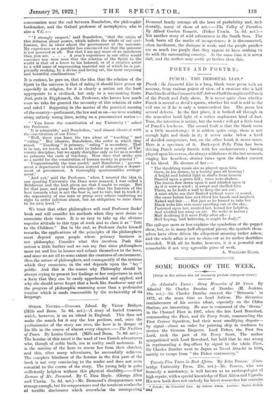POETS AND POETRY.
PUNCH : THE IMMORTAL LIAR.*
Punch : the Immortal Liar is a long, blank verse poem with an account, from various points of view, of a creature who is half Punchinello of the Comm edia dell' Ark and half the anglicized Punch
of the- Punch and Judy show. It is never quite clear whether Punch is mortal or devil's spawn, whether his soul is sold to the evil one or if he is only a transcendent liar. The poem has several defects. In the first place, it is bathed all through in the somewhat lurid light of a rather unpleasant kind of lust.
True, the intention is satiric, but the reader will get a little tired of Punch's lewdness. The second fault is that the blank verse is a little meandering : it is seldom quite crisp, there is not
enough light and shade in it; it never sinks below a level of decided competence, but, on the other hand, it never soars. Here is a specimen of it. Dark-eyed Polly Prim has been driving Punch nearly frantic with her enchantments ; having played upon his nerves, she always withdraws at the last moment, ringing her heartless, sinister tunes upon the darker current of his blood. He dreams of her :-
" The throbbing music she so played upon him Grew, in his dream, to a beauty past all bearing I A bright and baleful light in shafts from heaven Slanted upon a green hill ; trees were shaken, The leaves flew down upon it and whirled upon it As if it were a wind ; it swept and thrilled him. There, as he built a wall to keep the sea out, A mist-white sea that flashed without wave or sound, She came before him and lifted her hands and laughed, Naked and fair . . . But just as he leaned to take her Black webs like rain came ravelling out of the sky, Fastened upon her, meshed her, bound her helpless, And whirled her away on air. He woke in horror ; 'Half doubting if it were Polly after all— ; Half hoping, half believing, it might be Judy."
The epilogue more or less explains the symbolism of the puppet show, but, as in many half-allegorical pieces, the symbols them- selves have often driven the allegorical meaning rather askew,
and the whole affair is not as clean-cut as its author doubtless intended. With all its faults, however, it is a powerful and remarkable if not very agreeable piece of work.
A. WILLIAM.S-ELLIS.


































 Previous page
Previous page